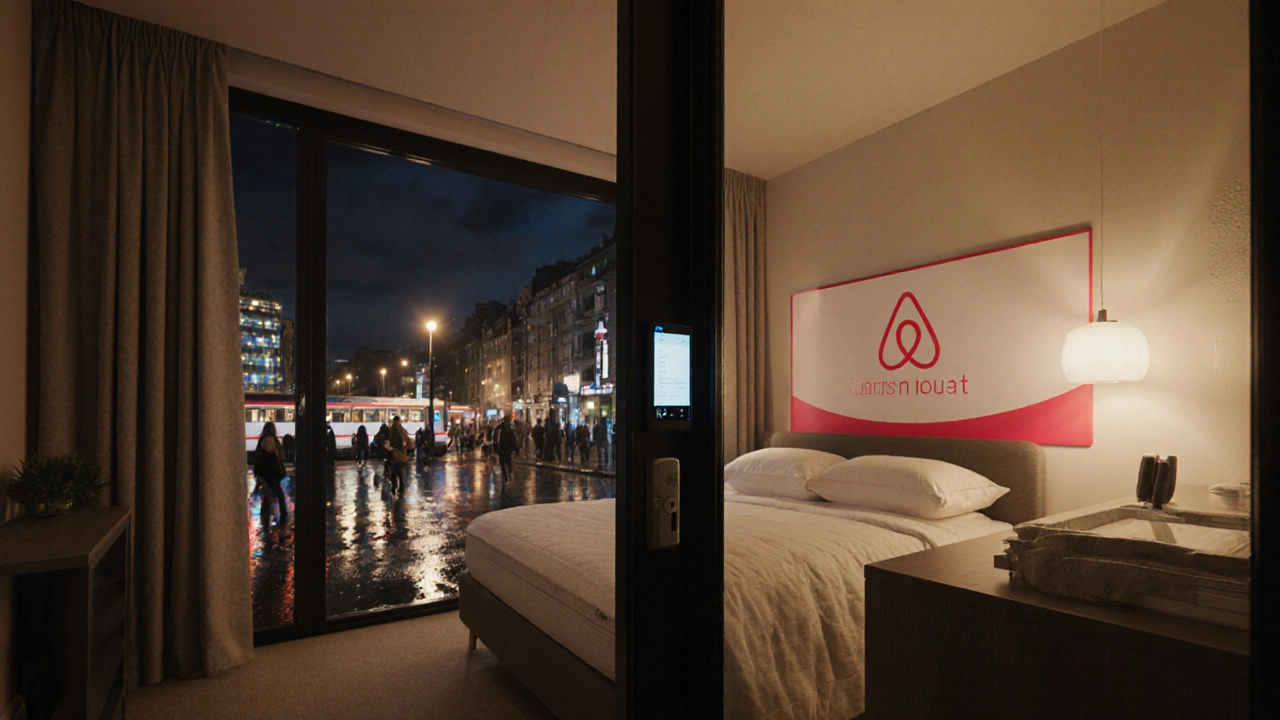Rental Property Profitability Calculator
Calculate Your Rental Profit
Estimate net profit for UK rental properties based on 2025 market conditions
Estimated Annual Profit
Enter your property details to see your potential profit
When you’re looking to make money from property in the UK, not all rentals are created equal. Some bring in steady cash with low hassle. Others promise big returns but eat up your time, money, and nerves. So what’s actually the most profitable rental property right now? The answer isn’t a single type-it’s a mix of location, demand, and how you manage it. But if you’re starting out or scaling up in 2025, one category consistently outperforms the rest: short-term lets in high-demand urban areas.
Why short-term lets are winning in 2025
In London, Manchester, Edinburgh, and even smaller cities like Brighton and Bristol, short-term rentals are pulling in 2-3 times the monthly income of traditional long-term lets. A two-bedroom flat in Shoreditch that rents for £1,800 a month on a 12-month lease can easily earn £150-£200 per night during peak season. That’s £4,500 to £6,000 in a single month. Even with cleaning, guest turnover, and platform fees, the net profit often lands between £3,000 and £4,500.
This isn’t a fluke. Tourism in the UK hit 40 million visitors in 2024, and business travel hasn’t fully shifted back to offices. Many professionals now work remotely three days a week and choose to stay in city-centre apartments for short stints. Airbnb, Booking.com, and Vrbo are saturated with long-term tenants-but still thin on quality, well-managed short-term stays. That gap is where the profit lives.
What makes a short-term let profitable?
Not every flat can be a money-maker. You need the right combo of features:
- Location: Within 1 mile of a train station, major attraction, or business district. Properties near London Bridge, Piccadilly Circus, or Manchester’s Northern Quarter see 80%+ occupancy in summer.
- Size: One or two bedrooms. Too big, and you struggle to fill it. Too small, and you lose the family and group market.
- Furnishings: Modern, clean, and functional. Guests pay for comfort-not just a bed. A good mattress, fast Wi-Fi, and a fully stocked kitchen matter more than a chandelier.
- Management: You can’t do this alone. Automated check-ins, professional cleaners, and a 24/7 contact line are non-negotiable. The best operators spend 10-15 hours a week managing 3-5 properties. More than that, and you’re working a job, not running a business.
One investor in Leeds bought a 720 sq ft flat for £145,000 in 2022. After £12,000 in renovations, he listed it on Airbnb. In 2024, it generated £38,000 in gross income. After mortgage, taxes, cleaning, and platform fees, his net profit was £26,400. That’s a 17% annual return on his total investment-far higher than any buy-to-let in the same area.
Long-term lets: still a solid choice, but slower
Don’t write off traditional rentals. They’re stable. They’re predictable. And they’re easier to finance. A three-bedroom house in Birmingham rented for £1,100 a month on a 12-month tenancy. After mortgage, insurance, repairs, and void periods, the net profit was around £500 a month-or £6,000 a year. That’s a 4.5% return on a £130,000 purchase.
The problem? Growth is flat. Rents in most UK cities rose 2-3% in 2024. Meanwhile, inflation, energy costs, and landlord regulations are squeezing margins. Council tax increases, the removal of mortgage interest tax relief, and stricter EPC rules mean long-term landlords are paying more to earn less.
Short-term lets don’t solve all of this-but they bypass some of it. You’re not bound by the same tenancy laws. You can adjust prices daily. You can charge higher rates for weekends, holidays, or events. You’re not stuck with a tenant who trashes the place for 12 months.

What about student lets and HMOs?
Student housing still has demand, especially near universities like UCL, Manchester, or Nottingham. But the market is crowded. In 2023, over 1,200 new student flats opened in London alone. Competition has driven down rents and increased voids. A six-bed HMO in Sheffield might earn £2,500 a month, but you’re managing six separate tenancies, dealing with noise complaints, and facing higher insurance premiums. Plus, local councils are cracking down on licensing.
HMOs can work-if you own the building, live onsite, and have systems in place. But for most investors, the complexity doesn’t justify the return. Short-term lets offer similar income with far less legal risk and tenant drama.
The hidden costs of short-term lets
Yes, the income is higher. But so are the risks:
- Regulation: London, Edinburgh, and parts of Wales now require planning permission for short-term lets over 90 days a year. In some boroughs, you need a special licence. Skip this, and you could face fines up to £20,000.
- Insurance: Standard landlord insurance won’t cover short-term guests. You need specialist holiday let insurance. It costs 40-60% more.
- Turnover: Cleaning, laundry, restocking supplies-each guest adds £50-£100 in costs. If you’re doing 20 bookings a month, that’s £1,000-£2,000 gone.
- Platform fees: Airbnb takes 3% from hosts. Booking.com takes 15%. That’s money straight out of your pocket.
The key is to build systems. Hire a local cleaner. Use smart locks and automated messaging. Track expenses with software like Beyond Pricing or Hostaway. Treat it like a business-not a side hustle.

What’s the best property type to start with?
If you’re new to this, start small. Look for a one-bedroom apartment in a city with strong tourism and weak long-term rental supply. Check:
- Local council rules on short-term lets
- Current occupancy rates on Airbnb (use AirDNA or Mashvisor)
- Average nightly rates for similar properties
- Monthly mortgage and service charges
For example, in Bristol, a studio flat near the Harbourside sells for £180,000. Average nightly rate: £110. Occupancy: 72%. Gross annual income: £28,900. After expenses, net profit: £19,500. That’s a 10.8% return-better than most buy-to-lets in the same area.
Don’t chase the biggest city. Look for emerging hotspots: Liverpool, Newcastle, York, or even coastal towns like Lyme Regis. They’re less regulated, have lower entry costs, and still get steady summer traffic.
Final verdict: short-term lets lead, but don’t ignore the basics
Is a short-term let the most profitable rental property in 2025? Yes-if you do it right. It’s not for everyone. You need capital, time, and discipline. But if you’re willing to learn the systems, it’s the fastest way to build rental income above inflation.
Long-term lets? Still safe. But they’re a slow grind. Student lets? High risk, high management. Buy-to-let in rural towns? Low returns, low demand.
The smartest investors aren’t just buying property. They’re buying location, flexibility, and control. That’s what short-term lets give you. And in 2025, that’s worth more than ever.
Can I turn my current buy-to-let into a short-term let?
It depends. First, check your mortgage terms-many buy-to-let loans ban short-term lets. Then, check local council rules. In London, you need planning permission if you rent for more than 90 days a year. You’ll also need to switch your insurance. If your property is in a good location and you’re ready to manage turnover, yes-it can be worth the hassle. But don’t assume your current tenant will be okay with it. You’ll likely need to end the tenancy.
How much money do I need to start?
You’ll need at least £100,000-£150,000 for a decent one-bedroom flat in a city centre. That covers the purchase price, stamp duty, renovation costs, and initial furnishings. You’ll also need 2-3 months’ worth of mortgage payments saved for voids. Some investors start with a shared ownership property or a co-investment deal to reduce upfront costs.
Are short-term lets legal in the UK?
Yes, but with restrictions. In England, you can rent out your property for up to 90 days a year without planning permission. Beyond that, you need approval from your local council. Scotland and Wales have stricter rules. Always check your lease agreement if you’re in a flat-some freeholders ban short-term lets entirely. Ignoring this can lead to eviction or fines.
Do short-term lets pay more tax?
You pay the same income tax as long-term lets-between 20% and 45% depending on your earnings. But you can claim more expenses: cleaning, utilities, platform fees, insurance, and even a portion of your internet bill. Many landlords use the £1,000 property income allowance to reduce paperwork. If your net profit is under £1,000 a year, you don’t need to report it. Above that, keep detailed records.
What’s the biggest mistake new investors make?
They buy based on dreams, not data. They see a pretty listing on Airbnb and assume it’ll be easy money. But occupancy rates, cleaning costs, and local regulations vary wildly. The best investors use tools like AirDNA to check occupancy, compare prices, and calculate net profit before they even view the property. Don’t fall in love with a building-fall in love with the numbers.

